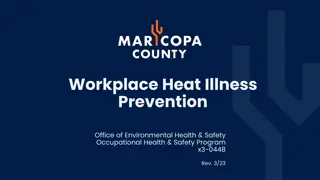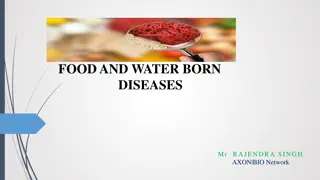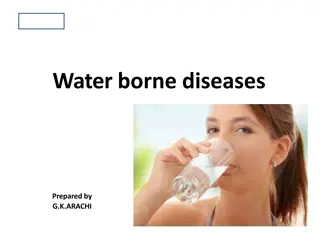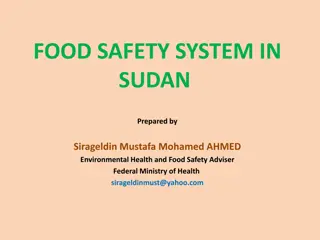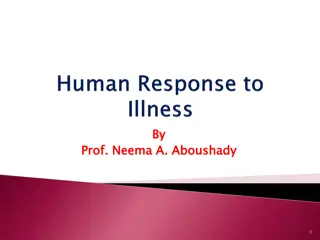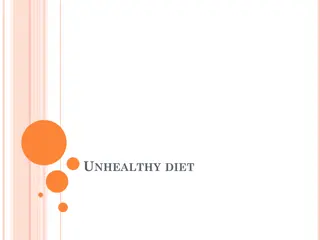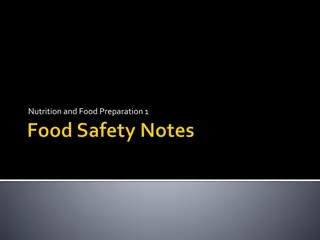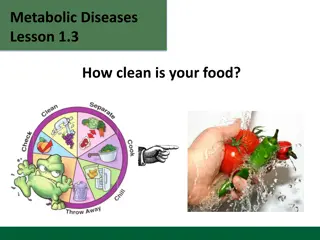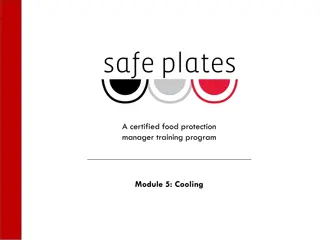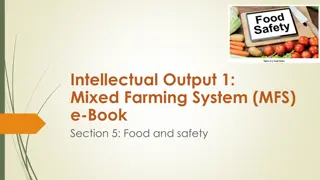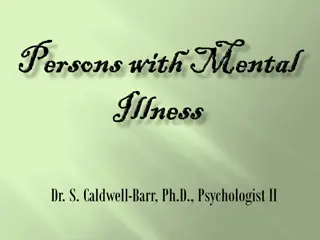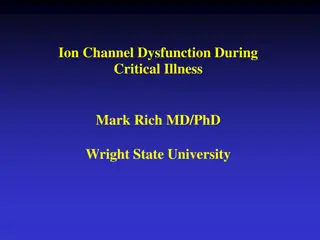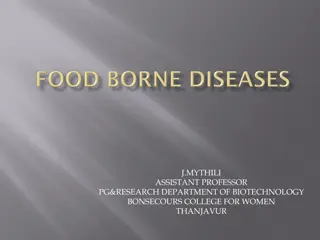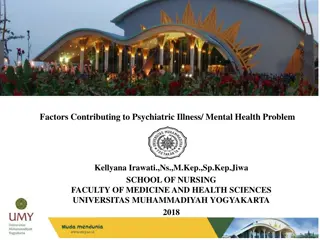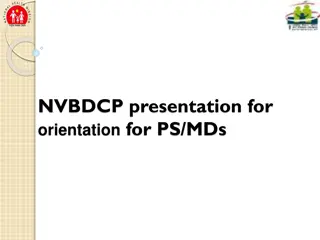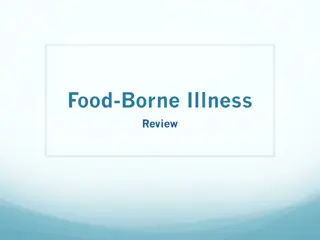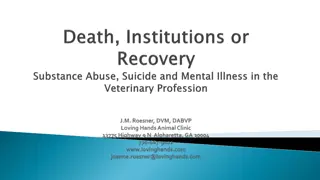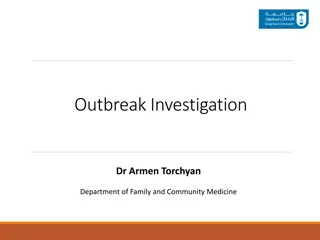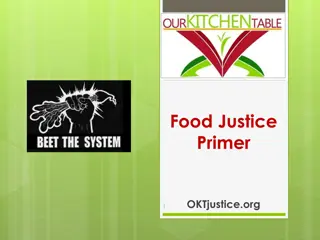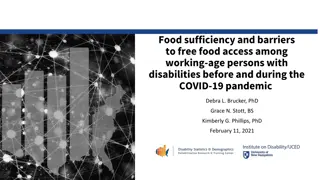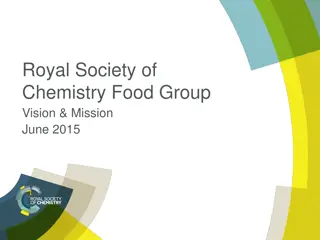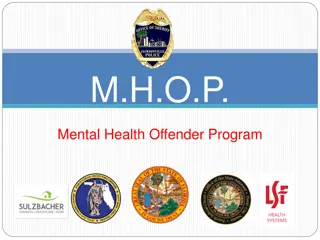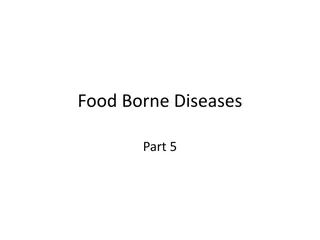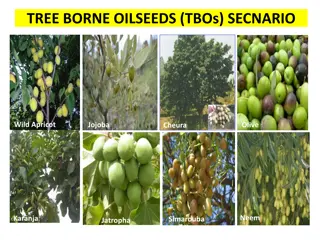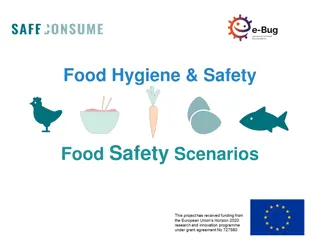A Student Exploration of the Global Impacts of Climate Change on Human Health
This research delves into the effects of climate change on human health, covering how a warming climate, changes in precipitation, and increased flooding frequencies impact various health aspects such as infectious diseases, nutrition, and mental health. The study provides a visual model illustratin
5 views • 17 slides
The History of NAMI and the Family Movement
Founded in 1977 by two mothers seeking support for loved ones with mental illness, NAMI (National Alliance on Mental Illness) has grown to be a leading grassroots organization advocating for mental health awareness, support, and education. The Contra Costa chapter, NAMI CC, has a rich history of pro
1 views • 15 slides
Understanding Food Safety in Hospitality and Catering
Learners will explore food-related causes of ill health in hospitality and catering, including microbes and bacteria that can lead to food poisoning. Factors such as warmth, time, food supply, and moisture create ideal conditions for harmful bacteria to thrive and cause illness. This topic covers fo
5 views • 75 slides
Understanding Mental Health vs. Mental Illness
Explore the nuanced differences between mental health and mental illness, where mental health pertains to the quality of mental and emotional wellbeing for everyone, while mental illness refers to diagnosable conditions with long-term effects that do not affect everyone in the same way. Gain insight
9 views • 18 slides
How are plant essential oils valuable as functional ingredients
Food Research Lab is one of the leading food industry consultants and offers various food production services. We provide food production and food manufacturing consultancy services to food, beverage and nutraceutical companies. Primary food production involves everything from food procurement, inve
8 views • 12 slides
Workplace Heat Illness Prevention Program Overview
This workplace heat illness prevention program overview discusses risk factors, how the body handles heat, types of heat illness, prevention strategies including water consumption and shade, importance of acclimatization, emergency response procedures, OSHA standards, job and personal risk factors,
0 views • 28 slides
Understanding Food and Water-Borne Diseases: Causes and Classification
Food and water-borne diseases, caused by contaminated food or water, lead to acute illnesses. These diseases are classified into food-borne infections and food-borne intoxications. Food-borne infections, triggered by pathogenic microorganisms, can be fungal, bacterial, viral, or parasitic, with long
3 views • 57 slides
Understanding Water-borne Diseases and Pathogens
Drinking contaminated water can lead to water-borne diseases, causing millions of deaths annually, especially in developing countries. Potable water is essential for health and development, as water-related diseases arise from inadequate water quality and poor sanitation practices. Various pathogens
1 views • 28 slides
Food Safety System in Sudan: Evolution and Current Challenges
Sudan's food safety system is managed by the Federal Ministry of Health through the inspection efforts of Public Health Officers. The evolution of food safety in Sudan has been marked by the reliance on the Public Health Act of 1939. Challenges include the need for improved surveillance of food-born
0 views • 19 slides
Food Equipment Usage Guidelines for Safe Food Handling
Enhance your knowledge on using equipment for making food with proper safety procedures. Learn about essential points like wearing protective gear, checking hot food temperatures, food safety principles, and sanitization requirements. Understand machine settings, food temperature checks, and serving
1 views • 22 slides
Nursing Strategies for Emotional Reactions to Illness
In this content, the focus is on understanding the stages of illness and the crucial role of nurses at each stage. It also highlights the patient's emotional needs during illness and the importance of maintaining a positive self-image. Nursing strategies for assisting patients in coping with anxiety
0 views • 8 slides
National Food Reserve Agency (NFRA): Enhancing Food Security in Nigeria
The National Food Reserve Agency (NFRA) under the Federal Ministry of Agriculture & Water Resources plays a crucial role in addressing agricultural production, storage, and marketing challenges in Nigeria. With a vision to ensure sustainable food access for all Nigerians and become a global food pro
1 views • 30 slides
Managing Physical Health in Severe Mental Illness with a Focus on Diabetes
This educational material presents a comprehensive slide set designed to aid in the management of physical health in individuals with severe mental illness, focusing on diabetes. It includes insights on the challenges faced by healthcare professionals, learning objectives on diabetes management, and
0 views • 14 slides
Understanding Involuntary Commitment Criteria for Adults with Serious Mental Illness
Involuntary commitment for adults with serious mental illness is a sensitive issue that involves specific criteria to determine if someone poses a danger to themselves or others. The criteria include having a serious mental illness, being a threat to self or others, or having an inability to provide
0 views • 67 slides
Exploring Food Science and Technology in Modern Society
Delve into the world of food science and technology with insights on what scientists do, the importance of understanding food, definitions of food science and food technology, factors affecting food spoilage, and traditional and modern food processing technologies. Gain knowledge on testing hypothes
0 views • 22 slides
Understanding the Impact of Tobacco Use on People with Serious Mental Illness
People with serious mental illness are significantly affected by tobacco use, with smoking being a leading preventable cause of early death in this population. This presentation highlights the reasons behind smoking in individuals with mental illness, challenges faced in cessation efforts, and the i
0 views • 12 slides
Understanding Food Poisoning and Its Causes
Food poisoning is a common threat that can be prevented with proper food handling. It is caused by various microorganisms, natural toxins, and chemical residues. The illness is characterized by rapid onset of symptoms like vomiting and diarrhea. Common bacteria causing food poisoning include Staphyl
0 views • 27 slides
Food Safety and Prevention of Food-borne Illnesses
An estimated 48 million Americans suffer from food-borne illnesses yearly, caused by harmful microorganisms due to poor food handling practices. Factors contributing to food-borne illnesses include improper cooking, inadequate storage, and cross-contamination. To prevent such illnesses, it is essent
0 views • 23 slides
Food Safety and Preventing Food-borne Illness
This lesson focuses on the importance of food safety, addressing how clean our food is and at what points safety can be compromised. It delves into common types of microbes that contaminate foods and explores ways in which food safety can be compromised. The activity involves case studies on food sa
0 views • 11 slides
Food Safety Incident Investigation: Baltimore City Illness Outbreak
Baltimore City experienced an illness outbreak linked to a lunch event, where 216 individuals fell ill after consuming contaminated food. The investigation revealed that improper handling and cooking of precooked frozen chicken led to the contamination with Clostridium perfringens. The incident unde
0 views • 40 slides
Enhancing Food Safety and Quality in Mixed Farming Systems
Food safety practices are crucial in preventing contaminants and food-borne illnesses, while maintaining food quality is essential for consumer satisfaction. Good Agricultural Practices (GAPs) and Good Veterinary Practices (GVPs) play key roles in ensuring safety and quality. Smart farming technolog
0 views • 11 slides
Understanding Mental Illness and Disability Rights
This content provides insights into commonly held attitudes and beliefs about mental illness, the American with Disabilities Act of 1990, definitions of mental illness per NRS 433A.115, and interactions with individuals with mental health issues. It also covers misconceptions, the 72-hour hold for m
0 views • 60 slides
Mastering Good Food Hygiene and Storage Practices
Understanding food spoilage causes, common food-poisoning bacteria, conditions for bacterial growth, ways to prevent food contamination, safe food handling practices, HACCP concept, types of perishable foods, importance of proper food storage, packaging materials for food, and recognizing signs of f
1 views • 27 slides
Understanding Ion Channel Dysfunction in Critical Illness
An intriguing case study presents a young male with weakness and coma in the ICU following pneumonia and sepsis. Nerve conduction results indicated critical illness myopathy and polyneuropathy, along with cardiac abnormalities. Reduced muscle excitability was attributed to a sodium channelopathy. Th
0 views • 14 slides
Understanding Food-Borne Diseases: Causes, Symptoms, and Prevention
Food-borne diseases are caused by the ingestion of contaminated food containing microorganisms or chemicals. There are two types of food infections - contaminated food acting as a carrier of microorganisms and food serving as a culture medium for pathogens. Bacteria, viruses, and parasites are commo
0 views • 20 slides
Factors Contributing to Psychiatric Illness and Mental Health Issues
Factors contributing to psychiatric illness and mental health problems include predisposing factors such as psychological and biological factors, as well as precipitating stressors like challenging stimuli. Mental health is defined as a state of well-being involving happiness, contentment, and effec
0 views • 15 slides
National Vector Borne Disease Control Program Overview
The National Vector Borne Disease Control Program (NVBDCP) focuses on preventing and controlling diseases such as Malaria, Dengue, Chikungunya, Filariasis, Japanese Encephalitis, and Kala-azar. Implemented at state level, NVBDCP aims to eliminate these diseases through strategic planning, policy mak
0 views • 9 slides
Understanding Legal Ramifications of Mental Illness in Criminal Justice System
Mental illness presents complex challenges in the criminal justice system, impacting court rulings, constitutional issues, and perceptions of vulnerability. Cases like James Holmes and John Hinckley highlight the intersection of mental health and criminal behavior. Legal standards regarding executio
0 views • 9 slides
Food Safety Review: Preventing Food-Borne Illness
Explore key aspects of food safety including the definition and symptoms of food-borne illnesses, categories of causes, common pathogens like Salmonella and E. coli, personal hygiene practices, proper food storage techniques, and thawing methods. Gain insights into preventing food-borne illnesses th
0 views • 11 slides
Understanding the Intersection of Addiction and Mental Illness in Veterinarians
Explore the profound impact of addiction and mental illness on veterinarians, highlighting the biological and environmental components, the prevalence of serious mental illness, the challenges in seeking mental health help, and the heightened risk of suicide within the veterinary profession. Promote
0 views • 28 slides
Spatial Epidemiology of Tick-Borne Diseases in Kansas
Explore the spatial epidemiology of tick-borne diseases in Kansas through data analysis and design of informative materials. Help the Kansas Department of Health and Environment by analyzing tick-borne disease data, calculating cases over the years, and creating graphs to visualize important trends.
0 views • 8 slides
Outbreak Investigation and Management in Public Health
Outbreak investigation is crucial in understanding, distinguishing, and managing disease outbreaks. This involves identifying the nature of outbreaks, studying key terms like endemic and epidemic, and examining outbreak settings such as food-borne and water-borne scenarios. By investigating outbreak
0 views • 53 slides
Understanding Food Justice and Insecurity: A Comprehensive Overview
Food Justice Primer provides insightful definitions and discussions on key concepts such as food justice, food insecurity, food sovereignty, and food deserts. It highlights the need for equitable sharing of benefits and risks in the food system, aiming to transform current disparities and inequities
0 views • 49 slides
Food Sufficiency and Barriers to Free Food Access Among Working-Age Persons with Disabilities Before and During COVID-19 Pandemic
Working-age persons with disabilities face economic vulnerability and higher chances of living in food-insecure households. This study explores food sufficiency and barriers to accessing free food during the COVID-19 pandemic. Data was collected through an online survey, revealing insights into food
1 views • 14 slides
Royal Society of Chemistry Food Group Vision & Mission Summary
The Royal Society of Chemistry Food Group aims to lead, promote, and disseminate the understanding and importance of chemistry in food. Their vision is to enhance food and nutrition security through advancing the chemistry of food ingredients. They strive to engage with various communities to promot
0 views • 4 slides
Mental Health Offender Program: Addressing Mental Illness in the Criminal Justice System
A pilot program, M.H.O.P., aims to reduce the burden on the criminal justice system by providing pretrial release, personalized care plans, and court supervision for defendants with mental illness. By addressing the needs of the mentally ill, the program strives to break the cycle of criminal behavi
0 views • 21 slides
Understanding Fungal and Chemical Food-Borne Intoxications
Fungal intoxications are caused by mycotoxins produced by fungi in improperly stored food, with aflatoxicosis being a significant concern. Aflatoxins can lead to acute hemorrhagic syndromes and long-term liver tumors. Prevention strategies include proper drying and storage of foods. Chemical food-bo
0 views • 19 slides
Tree Borne Oilseeds (TBOs) Scenario and Promotion Overview
This document provides insights into the Tree Borne Oilseeds (TBOs) scenario including a list of oilseeds like Neem, Karanja, and Jatropha, states covered, distribution, and uses of various TBOs. It also discusses the introduction of TBOs, their botanical names, oil/fat percentages, and utilization.
0 views • 12 slides
Enhancing Advising Process for Specified Illness Cover Workshops
Guidance on developing a structured process for advising on Specified Illness Cover, addressing challenges faced by financial brokers in selling and positioning the product. Workshop objectives include client engagement, research, explaining benefits, and product understanding. The content covers ag
0 views • 53 slides
Food Hygiene & Safety Scenarios: Learning the Importance of Proper Food Handling
Explore three scenarios highlighting the significance of food hygiene and safety. From understanding the consequences of foodborne illnesses to recognizing the importance of following proper food handling practices, these scenarios shed light on critical aspects of food safety. Learn how simple acti
0 views • 7 slides





